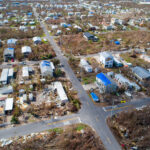The Bermuda-based Catlin Group announced from its London offices that the “three explorers conducting the Catlin Arctic Survey returned from the Arctic sea ice late on Wednesday (13 May), marking the end of a scientific expedition to help researchers determine how long the Arctic Ocean s sea ice cover will remain a permanent feature of the Earth.” The Catlin Group sponsored the expedition.
Pen Hadow, Ann Daniels and Martin Hartley were flown from a position on the ice approximately 500 kilometers (300 miles) from the North Geographic Pole to Eureka in Northern Canada, the world’s second-northernmost permanent research station. They will travel to Ottawa tomorrow and return to their London headquarters early next week.
“The expedition ended several weeks ahead of schedule because of concerns that the spring melting of the Arctic sea ice would make it too dangerous for aircraft to land at a later date,” the bulletin continued. The team measured the thickness of the floating sea ice to provide accurate data to scientists studying the impact of climate change in the Arctic.
Speaking from the Arctic just prior to his return from the ice, Survey leader Pen Hadow stated: “It was a grueling but successful expedition. In our time here we have captured approximately 16,000 observations and took 1,500 physical measurements of the thickness and density of the ice and snow. That s a valuable set of data we’ve collected for scientists, and we’re handing it over to them now.”
On Wednesday Hadow revealed that the average thickness of the sea ice over the course of the Survey was 1.774 meters. He explained: “This seems to suggest it was almost all first-year ice. Our science advisors had told us to expect thicker, older ice on at least part of the route, so it is something of a mystery where that older ice has gone. It’ll be interesting to see what scientists think about this.”
This data will now be analyzed by the Catlin Arctic Survey s scientific partners, which include the University of Cambridge and the US Navy s Department of Oceanography. Catlin noted that the conclusions drawn from this analysis “are expected to be presented at the UN Climate Change Conference to be held in December in Copenhagen. Negotiating teams from nations around the world will meet in Copenhagen to attempt to replace the Kyoto protocol agreement.”
Chief Executive Stephen Catlin congratulated the Catlin Arctic Survey ice team on a job well done and welcomed them back to a more hospitable climate. “Pen Hadow, Ann Daniels and Martin Hartley have experienced extreme physical hardships during their 73 days on the Arctic ice, but they have also gathered a wealth of scientific data,” he continued. “This data will allow researchers to improve their understanding of the impact of climate change on the Arctic region and the Earth as a whole.
“We look forward to the research that will be published over the coming months based on the data collected by the Catlin Arctic Survey. Whilst the on-ice segment of the Survey has been successfully completed, the Survey s scientific work continues.”
The bulletin noted that the three explorers “were forced to cope with extreme physical conditions during the first weeks of the expedition, even for Arctic standards.”
Peter Wadhams, Professor of Ocean Physics and Head of the Polar Ocean Physics Group in the Department of Applied Mathematics and Theoretical Physics at the University of Cambridge commented: “The data already sent back show the team have been travelling on first-year ice and provide an insight into its rate of growth this year. The rest of the data the team will provide on their return will help us to process and interpret it further and make a valuable contribution to data available to sea ice scientists.”
Current estimates as to how long ice will remain a year-round feature at the North Pole vary considerably, with scientific predictions ranging from five to 100 years. More accurate information such as that gathered by the Catlin Arctic Survey is essential if scientists and decision makers are to anticipate fully the potential impact of the loss of the Arctic sea ice on the world’s population.
Source: Catlin Group – www.catlin.com
Topics Trends
Was this article valuable?
Here are more articles you may enjoy.


 4,800 Claims Handled by Unlicensed Adjusters in Florida After Irma, Lawsuit Says
4,800 Claims Handled by Unlicensed Adjusters in Florida After Irma, Lawsuit Says  Chubb Wins Latest Battle With New York Diocese in Bid to Avoid Sex Abuse Claims
Chubb Wins Latest Battle With New York Diocese in Bid to Avoid Sex Abuse Claims  Tiny Texas City Repels Russia-Tied Hackers Eyeing Water System
Tiny Texas City Repels Russia-Tied Hackers Eyeing Water System  Investment Funds File New Suits Over Lighthouse Insurance Collapse in 2022
Investment Funds File New Suits Over Lighthouse Insurance Collapse in 2022 

